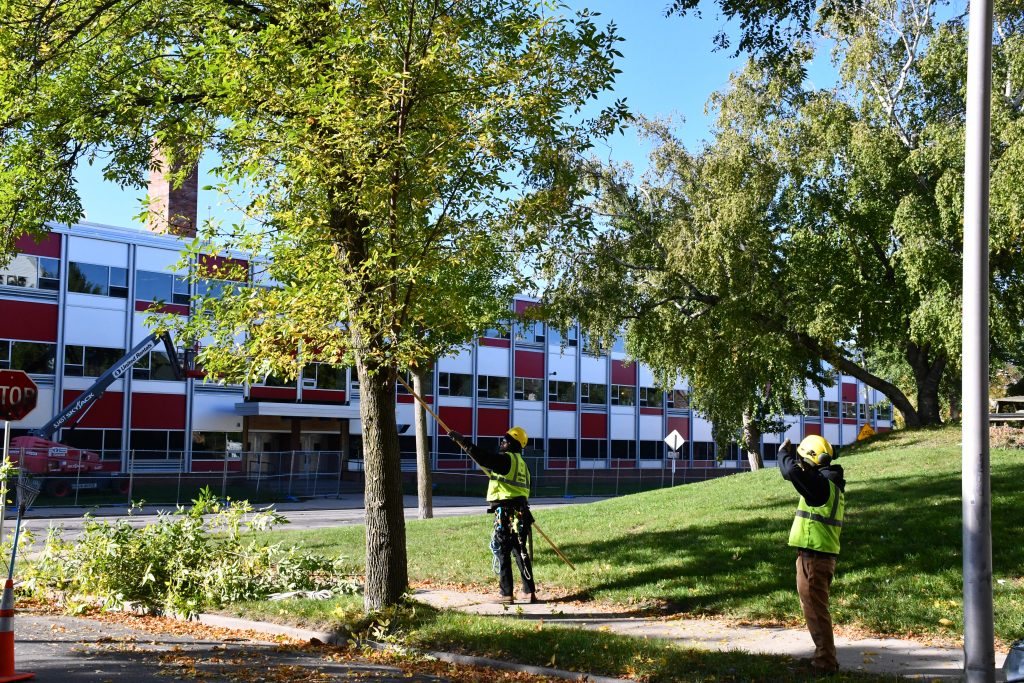Milwaukee Wins $12 Million Federal Tree Grant
City, county, MPS will use funding to improve tree canopy in low-income areas.
A partnership of the City of Milwaukee, Milwaukee County and Milwaukee Public Schools secured a $12 million federal grant to improve the city’s tree canopy.
It was the largest grant awarded by the U.S. Department of Agriculture (USDA) to a city in its Inflation Reduction Act-funded urban and community forestry grants program. And on Monday, it was a reason for officials to celebrate.
“It is such a wonderful time to be here because we’re really here to show you not just that your representation is working for you, but we’re working to bring federal dollars back home to Milwaukee,” said County Executive David Crowley at a press conference at Lynden Hill, an urban green space at 1255 N. 22nd St.
“We will increase the planting and maintenance of trees. We will depave schools, we will depave businesses, we will coordinate outreach and education and grow the urban forestry workforce right here in Milwaukee,” said Mayor Cavalier Johnson. “One hundred percent of the work will be conducted in disadvantaged areas of the city as defined by the White House climate and economic justice screening tool.”
But a lot remains to be sorted out, including how much money each entity will get and exactly what projects will be pursued. The partners are still working with the USDA to sort that out, even after being informed of the grant award. Part of the issue is because the city, as Urban Milwaukee reported in June, actually applied for a $40 million grant. City of Milwaukee Environmental Collaboration Office director Erick Shambarger told Urban Milwaukee that the partners are also working on specific requirements.
The broad goal remains to expand the city’s tree canopy, with Johnson citing a 2021 report on tree canopy coverage that found Milwaukee had one of the 20 greatest disparities in the country. “Milwaukee has 25% tree canopy coverage on average. This disparity looks like wealthier neighborhoods having 45% or more of coverage and people living in lower-income neighborhoods in Milwaukee having tree canopy coverage in the teens and sometimes as low as 6%.” Expanding the tree canopy is intended to not only beautify areas, but reduce the urban heat island effect and mitigate climate change impacts.
While the speakers addressed the crowd, a crew of Department of Public Works Forestry Service apprentices were being trained on nearby trees. Their training includes pruning and scaling trees for inspection. Combined with the city’s pre-Act 12 financial challenges, a staffing shortage in recent years has caused a slowdown in the maintenance of the tree canopy. Stumps can remain for years after damaged trees are removed. The issue has become more noticeable because of a wave of tree diseases and invasive pests like Emerald Ash Borer.
“We have a huge backlog,” said Shambarger in an interview after the event. “We want to expand the tree canopy, but today we are barely keeping up. We have a backlog of pruning. We have a backlog of removing dead trees. We want to start to get caught up on that backlog of all that stuff just on the city street trees. The county and MPS have all these playfields that have the same issues because they have the same financial issues.”
But using the recently adopted Climate and Equity Plan, Shambarger said the city is also looking to move forward on new initiatives. That includes expanding the capacity of the city’s tree nursey in the City of Franklin to supply trees. It also includes removing excess pavement wherever possible, including on the sidewalk terrace.
“It’s over five years, so we have a little bit of time to scale up,” said Shambarger.
The Redevelopment Authority of the City of Milwaukee has owned the Lynden Hill property since 1987. It was formerly the site of Misericordia Hospital, which relocated to Brookfield in 1969 and later rebranded as Elmbrook Memorial. The full-block site, immediately north of Milwaukee Public School’s Milwaukee High School of the Arts, includes a large bioswale and other stormwater retention features as well as numerous trees and a walking path.
The USDA awarded more than $1 billion to 385 applicants across all 50 states.
If you think stories like this are important, become a member of Urban Milwaukee and help support real, independent journalism. Plus you get some cool added benefits.
Political Contributions Tracker
Displaying political contributions between people mentioned in this story. Learn more.
- August 13, 2015 - Cavalier Johnson received $25 from David Crowley
City Hall
-
Council Blocked In Fight To Oversee Top City Officials
 Dec 16th, 2025 by Jeramey Jannene
Dec 16th, 2025 by Jeramey Jannene
-
Latest Effort to Adopt New Milwaukee Flag Going Nowhere
 Dec 3rd, 2025 by Jeramey Jannene
Dec 3rd, 2025 by Jeramey Jannene
-
After Deadly May Fire, Milwaukee Adds New Safety Requirements
 Dec 2nd, 2025 by Jeramey Jannene
Dec 2nd, 2025 by Jeramey Jannene























When I 1st moved to MKE (in the previous century), I thought it odd, even funny, that a built-up city had a forester – something akin to a landlocked country having a navy.
I quickly learned the importance of our city forestry department and appreciate their work daily.